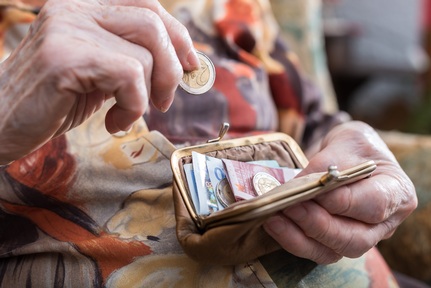Benefits rise won't protect people from poverty, warns charity
Benefits including pensions and Personal Independence Payments (PIP) rose by 3.1 per cent on 11 April, but the Joseph Rowntree Foundation (JRF) has warned this won’t "protect people from hardship".
 Benefits given by the Department of Work and Pensions (DWP), including Carer's Allowance and Attendance Allowance have increased - with the basic state pension alone rising by £4.25 to £141.85 a week.
Benefits given by the Department of Work and Pensions (DWP), including Carer's Allowance and Attendance Allowance have increased - with the basic state pension alone rising by £4.25 to £141.85 a week.
But with rising inflation (predicted to top 7.7 per cent in April), as well as growing energy bills and National Insurance Contributions fuelling a cost of living crisis, the JRF believes the government should have increased benefits by seven per cent to stop people going into poverty.
The government’s 3.1 per cent rise is based on the consumer prices index calculated last September– before living costs such as energy prices started to increase.
Benefit rises must 'match real rise in living costs'
“The government must, at a minimum, ensure that benefit rises match the real rise in living costs as an immediate first step to protect people from hardship", said Peter Matejic, JRF’s deputy director for evidence and impact.
“With living costs predicted to rise further this year, it is difficult to comprehend the logic behind a choice not to act to protect the value of benefits. The government has chosen to weaken the incomes of the poorest at the worst possible moment.”
The JRF calls the 3.1 per cent benefits rise a real-terms cut to the incomes of households receiving it, which will pull 600,000 people into poverty.
Mr Matejic added: “A decade of cuts and freezes to benefits have left many people in our society in increasingly desperate situations, struggling to afford food, energy and basic hygiene products."
DWP weekly payment rates 2022-2023
Benefits payments are paid as much as four weeks in arrears, and so although the rise came into effect from 11 April, recipients will not see the increase straightaway.
Here is a round up of the key benefit rises.
State Pension
• Full New State Pension: £185.15 (up from £179.60)
• Basic Old State Pension (Category A or B): £141.85 (up from £137.60)
Personal Independence Payment (PIP)
A Personal Independence Payment (PIP) can help with extra living costs if a person has both a long-term physical or mental health condition or disability and difficulty doing certain everyday tasks or getting around.
Daily Living Component:
• Enhanced: £92.40 (up from £89.60)
• Standard: £61.85 (up from £60)
Mobility Component:
• Enhanced: £64.50 (up from £62.55)
• Standard: £24.45 (up from £23.70)
Attendance Allowance
Attendance Allowance helps pay for an individual’s personal care if they’ve reached State Pension age and are disabled.
• Higher rate: £92.40 (up from £89.60)
• Lower rate: £61.85 (up from £60)
Employment and Support Allowance (ESA)
ESA is offered to people with a disability or health condition that affects how much they can work.
• Under 25: £61.05 (up from £59.20)
• 25 or over: £77.00 (up from £74.70)
Pension Credit
Pension Credit helps people with living costs such as ground rent, if they are over State Pension age and on a low income.
• Single: £182.60 (up from £177.10)
• Couple: £278.70 (up from £270.30)
Carer’s Allowance
Carer’s Allowance is given to individuals who care for someone at least 35 hours a week and they get certain benefits.
• £69.70 (up from £67.60)
Statutory Sick Pay (SSP)
Statutory Sick Pay is paid to people if they are too ill to work. It is paid by their employer for up to 28 weeks.
• Standard rate: £99.35 (up from £96.35)
Universal Credit (Monthly rate)
Universal Credit helps people with their living costs if they are on a low income, out of work or you cannot work.
Single:
• Single under 25: £265.31 (up from £257.33)
• Single 25 or over: £334.91 (up from £324.84)
Couple:
• Joint claimants both under 25: £416.45 (up from £403.93)
• Joint claimants, one or both 25 or over: £525.72 (up from £509.91)
To read about all the benefits that can be claimed while receiving care, click here
Latest News
 29-Jul-24
Dementia Bus gives carehome.co.uk staff insight into life with dementia
29-Jul-24
Dementia Bus gives carehome.co.uk staff insight into life with dementia
 01-Mar-24
Find out the top care homes in 2024
01-Mar-24
Find out the top care homes in 2024
 21-Mar-23
UK's top care homes in 2023 revealed
21-Mar-23
UK's top care homes in 2023 revealed
 03-Jan-23
carehome.co.uk launches free care helpline
03-Jan-23
carehome.co.uk launches free care helpline
 13-Dec-22
5 mins with Emily Whitehurst, chief operating officer for Constantia Healthcare
13-Dec-22
5 mins with Emily Whitehurst, chief operating officer for Constantia Healthcare